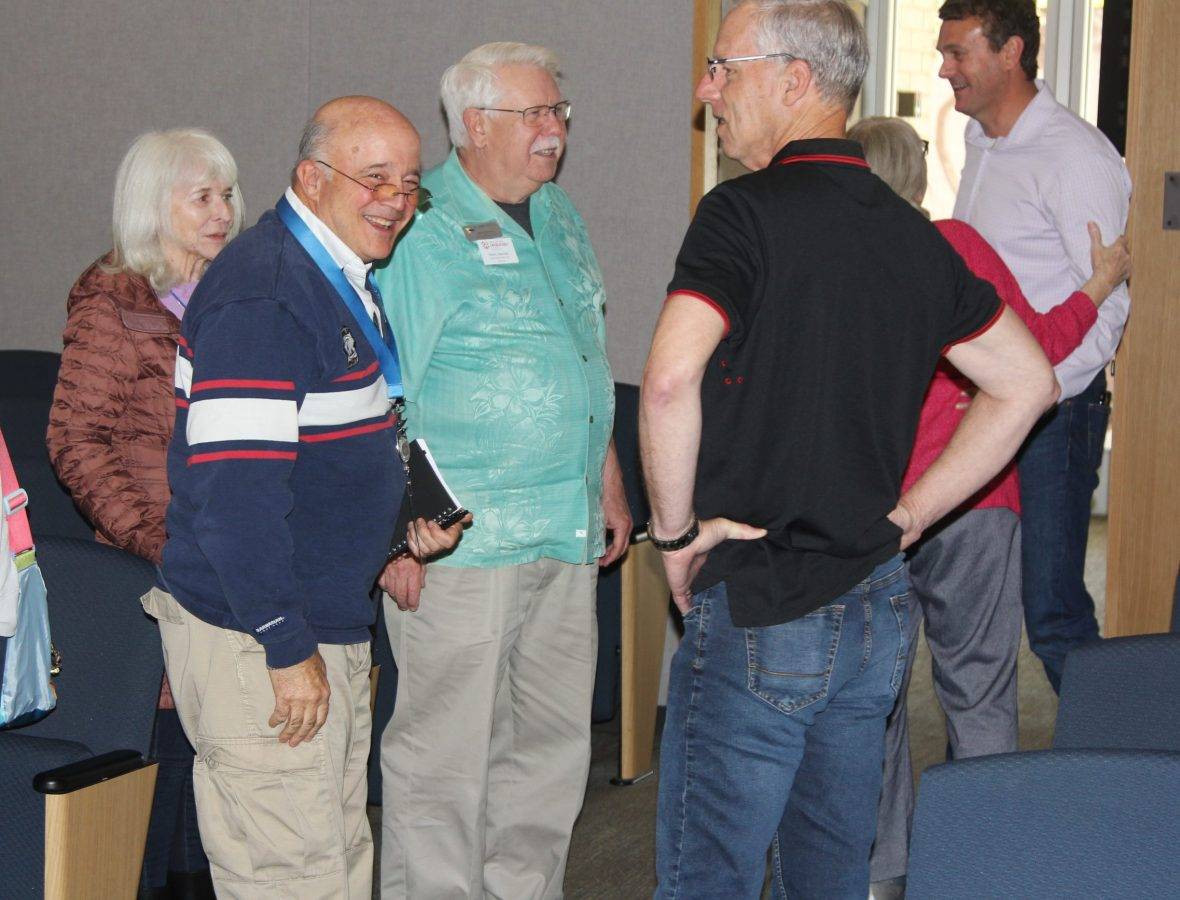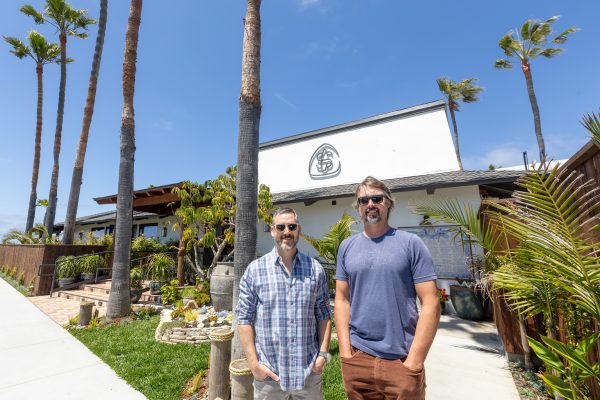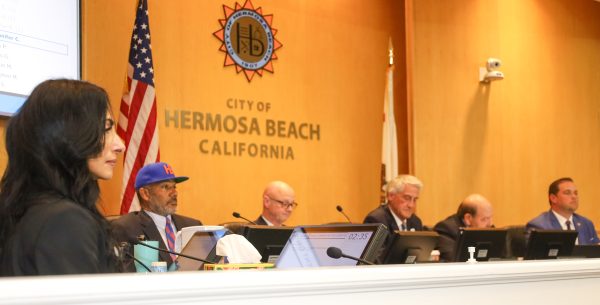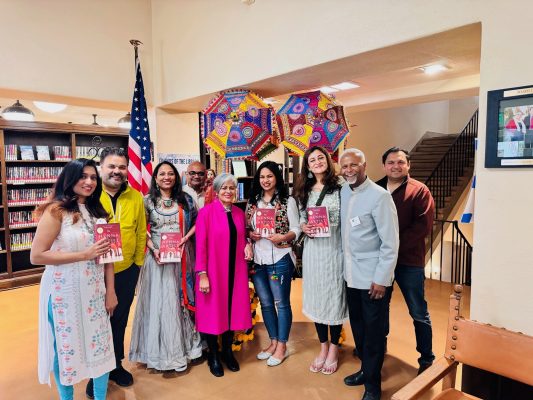by Garth Meyer
Boots rustling the cheatgrass, 30-odd-sixes in hand, Bill Brand and Nils Nehrenheim patrolled the fences. Up a slope, inside a cabin, Jim Light clanked away on a typewriter writing a ballot measure.
If today’s Redondo Beach was an old Western playing at the former Fox Redondo Theatre, the story may have looked like this.
The “cabin” the three figures were protecting was the city’s waterfront. The place Brand had seen as a kid and marveled that he got to live here. The place Nehrenheim had become an apostle in defense of, the place where Light chose to live 30 years before, during an Air Force assignment.
The threat past the fenceline was CenterCal, the public-private partnership to remake the Redondo Pier and beyond. Brand, Nehrenheim and Light, among many others, fought it to a final submission – and $2 million in gold coins the city had to pay to settle five lawsuits – just two years ago.
The next winter, Brand, who had become a two-term Redondo Beach mayor, died with a year left in office. Who would succeed him?
Light did, appointed by now-City Councilman Nehrenheim and his colleagues. Light was asked to assure them he would not run for election after he completed Brand’s term, but he did run, against Nehrenheim, and the old allies became challengers.
When the votes were announced March 13 at city hall, Nehrenheim stood in the doorway in 501s and an oxford shirt, heard the verdict, and walked up to Light, put his hand on his shoulder and congratulated him.
Light, the man who had critiqued and badgered the city, sued it, and campaigned against its policies, was now its elected mayor.
“I’m very happy with the result. I’m glad that Brand’s army and the slow-growth movement led the charge,” Nehrenheim said, who nonetheless suggested Light should have never been appointed mayor.
“He was clearly politicking when he said he wouldn’t run. He was saying that to get the votes. He was finishing Mayor Brand’s term. That’s it. Mayor Brand’s term. If he would’ve been honest, none of us would’ve chosen him. It would have been 5-0.”
Light said during the campaign that he was truthful the night he was appointed, that he had no intention of running, but once he got into office, what he learned changed his mind.
“I’ve been here for eight years. Mayor Light decided to jump into the race after the fact,” Nehrenheim said. “He still has a lot to learn, that you can’t learn in one year.”
Nehrenheim started on the city council in 2017.
A councilmember from 2015-23, Christian Horvath said of Light, “Jim started the swell of negativity; to batter, to belittle people not part of (he, Brand and Nehrenheim’s) belief system. And it got out of control. It’s only festered and grown.”
Nehrenheim first met Light in 2013, when the two worked on a campaign against a ballot measure that would have allowed AES to build thousands of housing units on the power plant site.
Horvath told voters this year to list Light fourth, of five candidates, in the new ranked-choice voting.
“I am not at a space that I can trust Jim Light,” Horvath said. “A lot of things he says, he believes are true but aren’t. If he continues to look at things from a broad perspective he’ll be more successful. If Jim tries to mansplain his point of view…”
“He and Bill (Brand) created the negativity, the angst. Bill always thought compromise was a dirty word. Their strategy of hyperbole and lies to effectuate their own perspectives. I remember one of the e-mails that came out of the L.A. Times article [“Crude e-mails reveal nasty side of a California beach city’s crusade to halt growth” – Nov. 14, 2022] of Bill saying ‘we need Trump-like slogans…’”
What were the lies?
“The dishonesty is when you tell people things, exaggerations, hyperbole when you are so invested in your opinion. Jim Light likes to get the last word always, but it’s not always fact-based,” Horvath said. “Some of it is; it’s not complete bulls—.”
Appointment year
Light was appointed mayor 11 days after Brand’s death, in an action taken in one council meeting, culminating in a 3-2 vote. Councilmembers Paige Kaluderovic and Scott Behrendt voted against the appointment, Kaluderovic advocating to take more time to interview candidates. Behrendt just didn’t think Light was the right choice.
Both councilmembers later encouraged and endorsed his run for mayor.
Looking back on the year Light has spent in office, he said he accomplished more than he thought he would.
He listed the harbor patrol situation – moving the harbor master position back to the harbor; getting the city’s housing element certified by the State, protecting it from the Builder’s Remedy (an exemption in state law for builders if a city has no state-certified housing element); making progress on waterfront plans, and some environmental work involving native plants.
Light also cited the design stage of improving Seaside Lagoon, the boat ramp project moving ahead, and interest from the Marine Mammal Care Center (MMCC) to open a facility in the harbor, at the former Joe’s Crab Shack site.
“As an educational entity, MMCC would never be much of a revenue generator, but it will buoy up supporting businesses,” Light said.
Leading up to the election, at the Feb. 20 Easy Reader/BeachLife Festival mayor’s forum, Light said he would accept a deal for 90% parkland on the AES site and 10% housing – with conditions.
Nehrenheim later criticized the comment.
What were the conditions Light referred to?
“I misheard the question. Under the right conditions, I would make the trade for commercial, not housing,” he said. “I wouldn’t for housing, not under the current mandates. You lose all control now.”
The challenger
Nehrenheim suggests Light’s answer at the forum was calculated.
“I think ranked-choice voting affected how many candidates came out, and it definitely affected candidates’ promises,” he said.
The 2025 election was the debut of ranked-choice voting in Redondo Beach, which Nehrenheim also questions in general. (Both he and Light prefer a system known as STAR voting).
“I think a lot of people sat out. They didn’t understand ranked-choice. You had a few protest candidates, you had a few viable candidates,” Nehrenheim said.
He summarized a key role of his during his two terms on the city council; working closely with District Two representative Todd Loewenstein.
“The hard work of the firewall, of the last eight years,” Nehrenheim said. “Todd and I provided the firewall for Mayor Brand so he could move things forward.”
What about the 2021 election of Zein Obagi, Jr. in District Four?
“It converted the firewall into action,” Nehrenheim said. “The mayor is powerless unless he has the council behind them.”
Nehrenheim and Loewenstein will term-out April 1, to be replaced by Brad Waller and Chadwick Castle, respectively.
“I always have faith in the voters. Long-term, they always make the right decision,” Nehrenheim said.
He told of a dinner meeting he put together at a private citizen’s house a week after Mayor Brand’s death, with about 15 people in attendance, including Light.
Who should be mayor, was the question.
“We didn’t want be a kingmaker, it’s not good for the voters,” Nehrenheim said. “We all agreed, it should be no one who would run for election.”
Nehrenheim told Easy Reader he will now continue his work with “Our Neighborhood Voices,” a grass-roots effort to reassert local control of housing construction. ER











